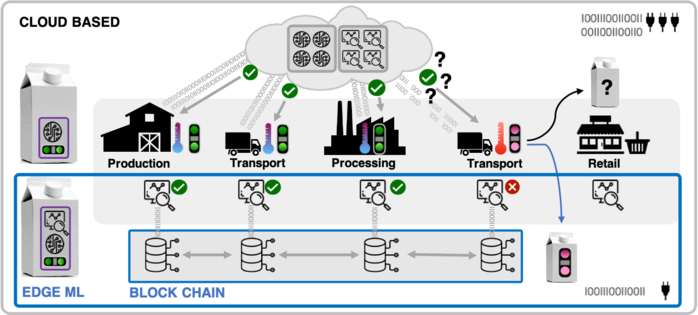This project focuses on intelligent food traceability. Novel sensors integrated in the packaging design support the targeted collection of relevant data. Current trends in machine learning (ML) on the edge (Edge ML), i.e. the analyses take place directly at the point of origin of the data and not retrospectively in the cloud, enable analyses in real time. This also allows forecasting to be integrated, for example, to predict critical conditions predictively rather than identifying critical conditions only retrospectively. Since these analyses require a lot of computing power, they are often energy-intensive. Similarly, the sampling rate of sensors is often fixed and a lot of data is analyzed unnecessarily.
The benefits of this project idea are best motivated by the example of Carrefour S.A.. By scanning a QR code, consumers can view data from the manufacturing process from farm to supermarket in an app. This example shows the benefits of sensor-based collection of data for product traceability, also by the customer. On the other hand, it also shows the enormous, often underutilized, potential for companies. Data is collected and stored, but often not analyzed in real time. This is where this project begins by:
- Integrating existing approaches of ML for energy-efficient, edge-based data analysis in the food supply chain.
- Integrating techniques to detect the volatility of sensor data streams and optimize sampling rates to reduce data volumes.
- Selecting appropriate existing technologies from the fields of sensors, blockchain, and hardware for Edge ML to implement a prototype.
The primary goal is to study the combination of different technologies in the food supply chain: smart sensors for data generation, blockchain technology for data storage, and Edge ML technology with machine learning algorithms for real-time food analysis. This includes designing and building a prototype. We plan to evaluate the performance of our approach for real-time analysis in terms of required energy as well as the response time (i.e., the time required to provide insights from data analysis), specifically comparing low-power mini PCs (Rasberry Pi, Jetson Nano) with edge computing servers and cloud computing systems. To select ML algorithms, we will define a process for data preparation, learning and evaluation of the ML model with the help of which comparison of diverse algorithms is possible. Adaptive monitoring will reduce the amount of data and make data analysis more feasible. We plan an open system design with defined interfaces, so that single components can be exchanged.


